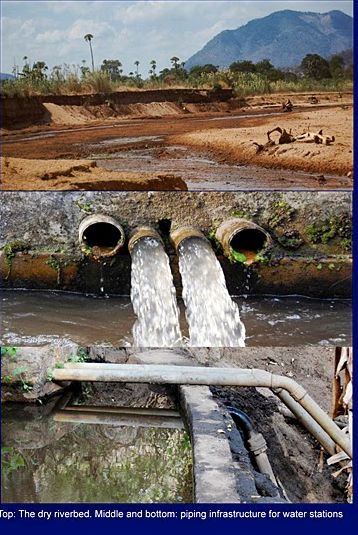 In August, Stony Brook Senior Michelle Pizer travelled to Tanzania to study the challenges that people in rural areas face in accessing clean, safe drinking water. Pizer’s trip was partially funded by SoMAS and was coordinated by Kamazima Lwiza, associate professor in SoMAS and faculty advisor of the Stony Brook Environmental Club. She recently presented a slideshow describing what she learned on her trip at the Environmental Studies Living Learning Center at Hendrix College.
In August, Stony Brook Senior Michelle Pizer travelled to Tanzania to study the challenges that people in rural areas face in accessing clean, safe drinking water. Pizer’s trip was partially funded by SoMAS and was coordinated by Kamazima Lwiza, associate professor in SoMAS and faculty advisor of the Stony Brook Environmental Club. She recently presented a slideshow describing what she learned on her trip at the Environmental Studies Living Learning Center at Hendrix College.
Pizer, an environmental studies and political science major, conducted a survey of water stations in the Mpwapwa region to get an idea of how far people travel to get water, particularly in the dry season. In Tanzania, women and children are responsible for collecting the water and the distance traveled to retrieve water can be up to 10 kilometers.
Many people in Tanzania do not have reliable access to clean drinking water. During the dry season of June through October, much of Tanzania experiences a drought and villagers are unable to access to water. In the rainy season of November through May, there is frequently flooding which causes drinking water to become contaminated.
In Mpwawa, each town Pizer visited had 5 or 6 water stations. Villagers pay fees to use these water stations in order to repay the loan from the World Bank which funded the piping infrastructure.
The water provided at these stations is only minimally treated. The water comes from the river, then is put in tanks where the large particles settle out. The water then goes through a charcoal filter before going through pipes to the water station.
 “It’s not really purified,” says Pizer, “It’s deceiving to see the water come out of the tap because it looks pretty clean. But the water may not be as clean and safe as it appears.”
“It’s not really purified,” says Pizer, “It’s deceiving to see the water come out of the tap because it looks pretty clean. But the water may not be as clean and safe as it appears.”
With a translator, Pizer interviewed people in charge of committees and village chairmen about the sources of their water, how people use the water station, and what people must pay for the water.
Speaking with Tanzanians was the best part of the trip, says Pizer, “The people I met were the friendliest, warmest, and most welcoming people.”
While Pizer had traveled to developing nations before, this trip gave her new perspective. “It was kind of sickening, actually, how much we consume and how little they do,” she says. “Having access to clean and safe water is a basic human right I think sometimes we over look that.”



